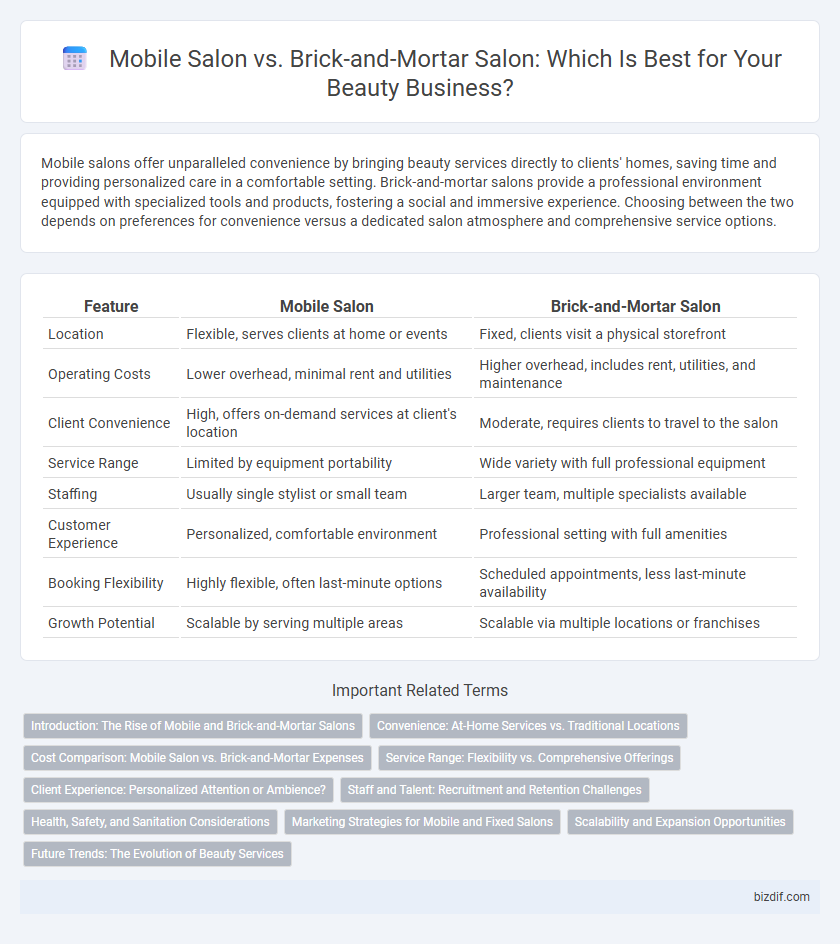Mobile salons offer unparalleled convenience by bringing beauty services directly to clients' homes, saving time and providing personalized care in a comfortable setting. Brick-and-mortar salons provide a professional environment equipped with specialized tools and products, fostering a social and immersive experience. Choosing between the two depends on preferences for convenience versus a dedicated salon atmosphere and comprehensive service options.
Table of Comparison
| Feature | Mobile Salon | Brick-and-Mortar Salon |
|---|---|---|
| Location | Flexible, serves clients at home or events | Fixed, clients visit a physical storefront |
| Operating Costs | Lower overhead, minimal rent and utilities | Higher overhead, includes rent, utilities, and maintenance |
| Client Convenience | High, offers on-demand services at client's location | Moderate, requires clients to travel to the salon |
| Service Range | Limited by equipment portability | Wide variety with full professional equipment |
| Staffing | Usually single stylist or small team | Larger team, multiple specialists available |
| Customer Experience | Personalized, comfortable environment | Professional setting with full amenities |
| Booking Flexibility | Highly flexible, often last-minute options | Scheduled appointments, less last-minute availability |
| Growth Potential | Scalable by serving multiple areas | Scalable via multiple locations or franchises |
Introduction: The Rise of Mobile and Brick-and-Mortar Salons
Mobile salons offer unparalleled convenience by bringing professional beauty services directly to clients' homes, catering to busy lifestyles and increasing accessibility. Brick-and-mortar salons provide a consistent, fully equipped environment with a variety of services and a social atmosphere, appealing to those seeking a traditional salon experience. The rise of mobile salons complements the established presence of brick-and-mortar locations, reflecting evolving consumer preferences in the beauty industry.
Convenience: At-Home Services vs. Traditional Locations
Mobile salons offer unparalleled convenience by bringing professional beauty services directly to clients' homes, eliminating travel time and scheduling conflicts. Traditional brick-and-mortar salons provide a dedicated space with specialized equipment and ambiance, ensuring a consistent, controlled environment for treatments. Clients seeking flexibility and personalized comfort often prefer mobile salons, while those valuing comprehensive services and immediate product availability tend to choose physical salon locations.
Cost Comparison: Mobile Salon vs. Brick-and-Mortar Expenses
Mobile salons typically incur lower overhead costs compared to brick-and-mortar salons, as they avoid expenses related to rent, utilities, and large salon staff. The initial investment for a mobile salon centers around a fully equipped vehicle, while brick-and-mortar locations require significant capital for leasing commercial space and maintaining salon infrastructure. Operational costs for mobile salons remain more flexible, enabling competitive pricing and potentially higher profit margins despite fluctuating travel expenses.
Service Range: Flexibility vs. Comprehensive Offerings
Mobile salons provide flexibility by offering personalized services at customers' preferred locations, ideal for quick touch-ups or specialized treatments. Brick-and-mortar salons typically offer a comprehensive range of services including advanced hair treatments, spa services, and professional consultations, benefiting from dedicated equipment and space. Clients seeking convenience may prefer mobile salons, while those desiring extensive beauty solutions often choose traditional salons for their varied offerings.
Client Experience: Personalized Attention or Ambience?
Mobile salons offer personalized attention by providing one-on-one service in the client's preferred environment, enhancing comfort and convenience. Brick-and-mortar salons create a curated ambience with professional decor, specialized equipment, and a social atmosphere that supports relaxation and expert styling. Clients seeking tailored interactions benefit from mobile services, while those valuing aesthetic surroundings often prefer traditional salon settings.
Staff and Talent: Recruitment and Retention Challenges
Mobile salons face unique recruitment challenges due to the need for versatile staff skilled in both customer service and travel logistics, often requiring flexible scheduling and independence. Brick-and-mortar salons attract talent through stable work environments, equipped with advanced tools and professional settings that foster career growth and skill specialization. Retention in mobile salons hinges on offering competitive pay and autonomy, whereas traditional salons focus on team culture and continued education to maintain staff loyalty.
Health, Safety, and Sanitation Considerations
Mobile salons must adhere to strict sanitation protocols within limited space, often using portable sterilizers and disposable tools to prevent cross-contamination. Brick-and-mortar salons typically have dedicated sanitation areas and ventilation systems that enhance air quality and reduce infection risks. Both salon types follow local health regulations, but stationary salons generally offer more controlled environments for maintaining hygiene standards.
Marketing Strategies for Mobile and Fixed Salons
Mobile salons leverage location-based marketing and social media campaigns targeting busy clients seeking convenience, while brick-and-mortar salons invest in local SEO and community events to build neighborhood loyalty. Mobile salons benefit from personalized appointment reminders and referral programs to enhance client retention, whereas fixed salons utilize in-store promotions and membership packages to encourage repeat visits. Both models optimize online booking systems and customer review platforms to increase visibility and attract new customers.
Scalability and Expansion Opportunities
Mobile salons offer greater scalability and expansion opportunities by eliminating the need for physical premises, allowing service providers to reach a wider geographic market with lower overhead costs. Brick-and-mortar salons face limitations in growth due to fixed locations and higher operational expenses such as rent and utilities, which can restrict expansion possibilities. Mobile salon businesses can quickly adapt to demand fluctuations and tap into new customer segments, making them more agile in scaling their services.
Future Trends: The Evolution of Beauty Services
Mobile salons offer personalized, convenient beauty services directly to clients' homes, leveraging technology for flexible scheduling and virtual consultations. Brick-and-mortar salons are evolving by incorporating advanced digital tools, immersive VR experiences, and eco-friendly innovations to enhance customer engagement and sustainability. The future of beauty services lies in a hybrid model combining mobile accessibility with in-salon expertise, driven by consumer demand for customization and seamless digital integration.
Mobile salon vs Brick-and-mortar salon Infographic

 bizdif.com
bizdif.com